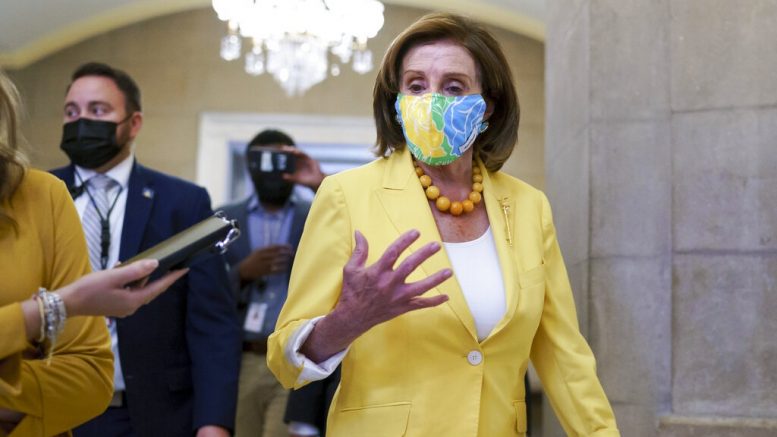WASHINGTON (AP) — Striking a deal with moderates, House Democratic leaders have muscled President Joe Biden’s multitrillion-dollar budget blueprint over a key hurdle, ending a risky standoff and putting the party’s domestic infrastructure agenda back on track.
The 220-212 vote Tuesday was a first move toward drafting Biden’s $3.5 trillion rebuilding plan this fall, and the narrow outcome, in the face of unanimous Republican opposition, signaled the power a few voices have to alter the debate and the challenges ahead still threatening to upend the president’s agenda.
From the White House, Biden praised the outcome as “a step closer to truly investing in the American people.” He said at a news conference that he had called to congratulate House leaders for the work.
Tensions had flared during a turbulent 24 hours that brought the House to a standstill as a band of moderate lawmakers threatened to withhold their votes for the $3.5 trillion plan. They were demanding the House first approve a nearly $1 trillion bipartisan package of other public works projects that’s already passed the Senate.
Backed by the White House, Speaker Nancy Pelosi huddled privately with lawmakers and leaders to engineer an offramp. In brokering the compromise, Pelosi committed to voting on the bipartisan package no later than Sept. 27, an attempt to assure lawmakers it won’t be left on the sidelines. It’s also in keeping with Pelosi’s insistence that the two bills move together as a more complete collection of Biden’s priorities. Pelosi has set a goal of passing both by Oct. 1.
Pelosi told her colleagues before the vote that the legislation would lead to a federal investment on par with the New Deal and the Great Society.
She brushed aside the delays. “That’s just part of the legislative process,” she said, according to an aide granted anonymity to discuss a closed-door caucus meeting.
“Not only are we building the physical infrastructure of America, we are building the human infrastructure of America,” Pelosi said on the House floor.
Easing off the stalemate will shelve, for now, the stark divisions between moderate and progressive lawmakers who make up the Democrats’ so-slim House majority. But as the drama spilled out during what was supposed to be a quick session as lawmakers returned to work for a few days in August, it showcased the party differences that threaten to upend Biden’s ambitious rebuilding agenda.
With Republicans fully opposed to the president’s big plans and arguing that Congress should be focused instead on the crisis in Afghanistan, the Democratic leaders have just a few votes to spare. That gives any band of lawmakers leverage that can be used to make or break a deal, as they are in position to do in the weeks to come as moderates and progressives draft and vote on the broader $3.5 trillion package.
“I think it’s important to those of us who are moderate Democrats to make sure that our voices are heard,” said Rep. Jim Costa, D-Calif., one of the negotiators.
Challenging their party’s most powerful leaders, nine moderate Democrats signed onto a letter late last week raising their objections to pushing ahead with Biden’s broader infrastructure proposal without first considering the smaller public works plan of road, public transit, and broadband spending that has already passed the Senate.
Their ranks grew as other moderates, including Rep. Stephanie Murphy, D-Fla., a leader of the Blue Dog caucus of centrist Democrats, raised similar concerns.
Progressives were outraged at the moderates, blaming them for potentially jamming Biden’s agenda, which is stocked with hard-fought party goals like child care, paid family leave and Medicare expansion, along with green infrastructure spending.
Outside groups, including Justice Democrats, started running campaign ads and members of Our Revolution, the organization aligned with Bernie Sanders, protested Tuesday outside the New Jersey office of Rep. Josh Gottheimer, a leader of the moderate effort.
“This is a ‘which side are you on‘ moment,'” said Our Revolution executive director Joseph Geevarghese, who promised to “organize like never before to hold Democrats accountable and get this bill over the finish line.”
The budget measure is at the heart of Biden’s “Build Back Better” vision for helping families and combating climate change and is progressives’ top priority, all of it largely financed with tax increases on the rich and big business.
The House committees are already fast at work drafting legislation to fill in the details of the $3.5 trillion package for consideration later this fall.
Progressives signaled early on they wanted the Biden budget priorities first before they agree to the smaller Senate package, worried it would be an insufficient down-payment on his goals.
But the moderates want the opposite, insisting Congress quickly send the smaller, bipartisan infrastructure measure they helped shape with the senators to Biden so he can sign it before the political winds shift.
While the moderates insist they also want to support Biden’s broader package, progressives are skeptical. Senate centrists Sen. Joe Manchin, D-W.Va., and Sen. Kyrsten Sinema, D-Ariz., have said they cannot support a $3.5 trillion package.
In fact, the moderates were also trying to win assurances from Pelosi that whatever version of the broader bill they draft in the House will be the same in the Senate — setting up another showdown between the party’s competing flanks and their vision for the rebuilding priorities.
“We have established a path forward,” Gottheimer said in a statement.
The compromise structured Tuesday’s vote to include passage of the budget resolution and the commitment for the September vote on the bipartisan package as part of a procedural vote, called the Rule.
So far, the White House has backed Pelosi as she has led her party in a tightly scripted strategy.
Republicans plan to reject the $3.5 trillion effort as big government spending, and GOP support for the slimmer $1 trillion bipartisan measure is now uncertain.
The conservative House Freedom Caucus said it opposes both the Biden budget and the bipartisan bill.
Republicans blasted Democrats for pursuing their priorities at a time when they said all focus should be on Afghanistan, as thousands of people including Americans are trying to flee the country as the U.S. withdraws its forces.
“We should be doing nothing else on this floor until every single American is home,” said Rep. Kevin McCarthy, the House minority leader.
Inserting his own wedge into the politics of the situation, Senate Republican leader Mitch McConnell said Tuesday on Fox News that he was rooting for the House moderates.
“I wish the moderates in the House success,” McConnell said. “I’m pulling for them.”































